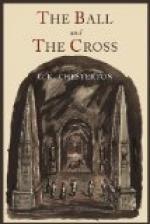“Are you mad?” asked Turnbull, glaring.
“Are you?” cried Evan. “Can you be anything else when you plaster your own house with that God-defying filth? Stand up and fight, I say.”
A great light like dawn came into Mr. Turnbull’s face. Behind his red hair and beard he turned deadly pale with pleasure. Here, after twenty lone years of useless toil, he had his reward. Someone was angry with the paper. He bounded to his feet like a boy; he saw a new youth opening before him. And as not unfrequently happens to middle-aged gentlemen when they see a new youth opening before them, he found himself in the presence of the police.
The policemen, after some ponderous questionings, collared both the two enthusiasts. They were more respectful, however, to the young man who had smashed the window, than to the miscreant who had had his window smashed. There was an air of refined mystery about Evan MacIan, which did not exist in the irate little shopkeeper, an air of refined mystery which appealed to the policemen, for policemen, like most other English types, are at once snobs and poets. MacIan might possibly be a gentleman, they felt; the editor manifestly was not. And the editor’s fine rational republican appeals to his respect for law, and his ardour to be tried by his fellow citizens, seemed to the police quite as much gibberish as Evan’s mysticism could have done. The police were not used to hearing principles, even the principles of their own existence.
The police magistrate, before whom they were hurried and tried, was a Mr. Cumberland Vane, a cheerful, middle-aged gentleman, honourably celebrated for the lightness of his sentences and the lightness of his conversation. He occasionally worked himself up into a sort of theoretic rage about certain particular offenders, such as the men who took pokers to their wives, talked in a loose, sentimental way about the desirability of flogging them, and was hopelessly bewildered by the fact that the wives seemed even more angry with him than with their husbands. He was a tall, spruce man, with a twist of black moustache and incomparable morning dress. He looked like a gentleman, and yet, somehow, like a stage gentleman.
He had often treated serious crimes against mere order or property with a humane flippancy. Hence, about the mere breaking of an editor’s window, he was almost uproarious.
“Come, Mr. MacIan, come,” he said, leaning back in his chair, “do you generally enter you friends’ houses by walking through the glass?” (Laughter.)
“He is not my friend,” said Evan, with the stolidity of a dull child.
“Not your friend, eh?” said the magistrate, sparkling. “Is he your brother-in-law?” (Loud and prolonged laughter.)
“He is my enemy,” said Evan, simply; “he is the enemy of God.”
Mr. Vane shifted sharply in his seat, dropping the eye-glass out of his eye in a momentary and not unmanly embarrassment.




